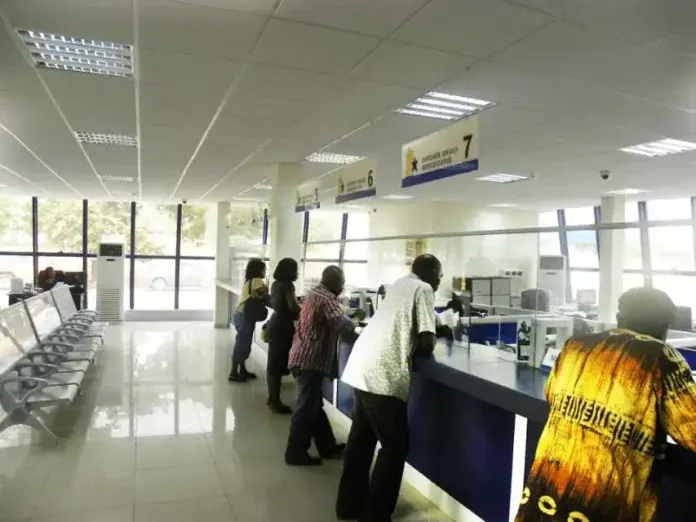By Ghana News
Copyright ghanamma

The Bank of Ghana has elevated customer satisfaction to a mandatory standard for financial institutions, declaring that excellent service delivery is no longer optional in Ghana’s increasingly digital banking landscape. The directive comes alongside the launch of the comprehensive 2024 Ghana Customer Satisfaction Index, which reveals mixed performance across the sector.
Speaking on behalf of Governor Johnson Asiama at the CIMG Ghana Customer Satisfaction Index launch, Franklin Belyne, Advisor on Sustainability for the Bank of Ghana, praised the Chartered Institute of Marketing Ghana for its research initiative. The report evaluates banks across service quality, customer satisfaction, and loyalty metrics in both consumer and business banking segments.
“In an era where customer centricity is no longer a luxury but a necessity, this report provides invaluable insight into how well our banks are serving their most important stakeholder group,” Belyne emphasized during the ceremony. The central bank’s position reflects growing regulatory focus on consumer protection as Ghana’s financial sector modernizes.
The 2024 index reveals significant performance variations across institutions. First Atlantic Bank topped the consumer banking category with a score of 95.3 percent, followed closely by First National Bank and Stanbic Bank, while Consolidated Bank Ghana emerged as the business banking leader with an impressive 99.6 percent score, ahead of CAL Bank.
However, the results expose concerning weaknesses in customer loyalty across the sector. John Awuah, CEO of the Ghana Association of Banks, acknowledged that while some metrics showed progress, others remained flat or recorded marginal declines. The industry-wide customer loyalty index particularly disappointed stakeholders.
“This is the point of concern. We want to understand exactly what the customers’ concerns are,” Awuah stated, highlighting that poor loyalty scores reflect customers’ tendency to maintain relationships with multiple banks rather than demonstrating preference for single institutions.
The loyalty challenge directly impacts banks’ long-term profitability and market positioning. Awuah emphasized that financial institutions must develop strategies to make customers “sticky” to their brands, noting that retaining quality customers would elevate overall industry service standards through competitive pressure.
Net promoter scores present additional challenges, with business banking exceeding 75 percent while consumer banking scores lag significantly. The net promoter metric measures customers’ likelihood to recommend their bank to others, serving as a critical indicator of both loyalty and sustainable profit generation.
Banks continue struggling with technological modernization despite customer demands for prompt, personalized service. Many institutions rely on legacy systems inadequate for supporting modern innovations including artificial intelligence, blockchain, and cloud computing platforms. These outdated infrastructures expose financial institutions to fraud, phishing, and data breaches while limiting service innovation.
Belyne warned that technological gaps, combined with low financial and digital literacy among consumers, restrict adoption of new banking services. “Financial institutions are encouraged to upgrade their data infrastructure, reinforce community service measures, and invest in digital skills and capacity building,” he recommended.
The timing of these findings coincides with accelerated digital transformation across Ghana’s banking sector, where mobile banking, USSD services, and internet platforms increasingly define customer experience. Banks failing to meet digital service expectations risk losing market share to more technologically advanced competitors.
The customer satisfaction measurement framework extends beyond traditional service metrics to encompass emotional engagement and trust-building capabilities. Belyne described the report as “a mural reflecting the sentiments, expectations, and experiences of thousands of Ghanaians who interact daily with our banks.”
Industry observers note that customer satisfaction standards increasingly influence regulatory oversight and market competition. The Bank of Ghana’s emphasis on mandatory excellence suggests potential policy implications for institutions consistently underperforming in customer experience metrics.
Awuah proposed expanding customer satisfaction measurement beyond banking to include telecommunications, utilities, and transport services. “By comparing service standards across sectors, we can drive improvement and provide consumers with informed choices,” he suggested, indicating potential cross-industry benchmarking initiatives.
The report serves as a strategic guide for financial institutions seeking to strengthen customer engagement and build sustainable competitive advantages. Both regulatory officials and industry leaders stressed that customer satisfaction determines long-term viability in Ghana’s evolving financial services market.
“Delivering an excellent customer experience is no longer optional. It is the defining factor that determines whether a business thrives or fails,” Belyne concluded, establishing customer service excellence as a survival imperative rather than competitive differentiator.
The comprehensive assessment positions customer satisfaction as central to Ghana’s financial system sustainability, with banks urged to leverage the insights for service innovation and trust-building initiatives across their customer base.



